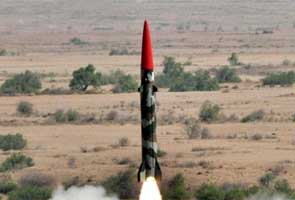
Washington: The US has a contingency plan to "snatch-and-grab" Pakistan's nuclear weapons, if and when the President believes they are a threat to either America or its interests, a media report has said, amid strains in bilateral ties.
Plans have been drawn up for dealing with worst-case scenarios in Pakistan, NBC news reported quoting current and former US officials, who say that ensuring security of Pakistan's nuclear weapons has long been a high US security priority even before the 9/11 terrorist attacks.
Among the scenarios drawn by the report is Pakistan plunging into internal chaos, terrorists mounting a serious attack against a nuclear facility, hostilities breaking out with India or Islamic extremists taking charge of the government or the Pakistan army.
NBC said the greatest success of the US war on terrorism, the military operation that killed Osama bin Laden in his safe house in Pakistan in May..., has fuelled concerns about Pakistan's nuclear arsenal.
The report said there were increasing suspicions among US officials that Osama had support within the Inter-Services Intelligence (ISI) and the Abbottabad operation had emboldened those in Washington who believe an orchestrated campaign of lightning raids to secure Pakistan's nuclear weapons could succeed.
In the aftermath of the bin Laden raid, US military officials have testified before Congress about the security of Pakistan's nuclear weapons and the threat posed by "loose nukes" nuclear weapons or materials outside the government's control. And earlier Pentagon reports also outline scenarios in which US forces would intervene to secure nuclear weapons that were in danger of falling into the wrong hands.
Such discussions of Pakistan's nuclear arsenal, now believed to consist of as many as 115 nuclear bombs and missile warheads, have gotten the attention of current and former Pakistani officials.
In an interview with NBC News, former Pakistan military ruler Pervez Musharraf warned that a snatch-and-grab operation would lead to all-out war between the countries, calling it "total confrontation by the whole nation against whoever comes in."
"These are assets which are the pride of Pakistan, assets which are dispersed and very secure in very secure places, guarded by a corps of 18,000 soldiers," said a combative Musharraf, who led Pakistan for nearly a decade and is again running for president.
"...(This) is not an army which doesn't know how to fight. This is an army which has fought three wars. Please understand that," he said.
Pervez Hoodboy, Pakistan's best known nuclear physicist and a human rights advocate, rarely agrees with the former president. But he, too, says a US attempt to take control of Pakistan's nukes would be foolhardy.
"They are said to be hidden in tunnels under mountains, in cities, as well as regular air force and army bases," he said. "A US snatch operation could trigger war; it should never be attempted."
Despite such comments, interviews with current and former US officials, military reports and even congressional testimony indicate that Pakistan's weaponry has been the subject of continuing discussions, scenarios, war games and possibly even military exercises by US intelligence and special forces regarding so-called "snatch-and-grab" operations.
Plans have been drawn up for dealing with worst-case scenarios in Pakistan, NBC news reported quoting current and former US officials, who say that ensuring security of Pakistan's nuclear weapons has long been a high US security priority even before the 9/11 terrorist attacks.
Among the scenarios drawn by the report is Pakistan plunging into internal chaos, terrorists mounting a serious attack against a nuclear facility, hostilities breaking out with India or Islamic extremists taking charge of the government or the Pakistan army.
NBC said the greatest success of the US war on terrorism, the military operation that killed Osama bin Laden in his safe house in Pakistan in May..., has fuelled concerns about Pakistan's nuclear arsenal.
The report said there were increasing suspicions among US officials that Osama had support within the Inter-Services Intelligence (ISI) and the Abbottabad operation had emboldened those in Washington who believe an orchestrated campaign of lightning raids to secure Pakistan's nuclear weapons could succeed.
In the aftermath of the bin Laden raid, US military officials have testified before Congress about the security of Pakistan's nuclear weapons and the threat posed by "loose nukes" nuclear weapons or materials outside the government's control. And earlier Pentagon reports also outline scenarios in which US forces would intervene to secure nuclear weapons that were in danger of falling into the wrong hands.
Such discussions of Pakistan's nuclear arsenal, now believed to consist of as many as 115 nuclear bombs and missile warheads, have gotten the attention of current and former Pakistani officials.
In an interview with NBC News, former Pakistan military ruler Pervez Musharraf warned that a snatch-and-grab operation would lead to all-out war between the countries, calling it "total confrontation by the whole nation against whoever comes in."
"These are assets which are the pride of Pakistan, assets which are dispersed and very secure in very secure places, guarded by a corps of 18,000 soldiers," said a combative Musharraf, who led Pakistan for nearly a decade and is again running for president.
"...(This) is not an army which doesn't know how to fight. This is an army which has fought three wars. Please understand that," he said.
Pervez Hoodboy, Pakistan's best known nuclear physicist and a human rights advocate, rarely agrees with the former president. But he, too, says a US attempt to take control of Pakistan's nukes would be foolhardy.
"They are said to be hidden in tunnels under mountains, in cities, as well as regular air force and army bases," he said. "A US snatch operation could trigger war; it should never be attempted."
Despite such comments, interviews with current and former US officials, military reports and even congressional testimony indicate that Pakistan's weaponry has been the subject of continuing discussions, scenarios, war games and possibly even military exercises by US intelligence and special forces regarding so-called "snatch-and-grab" operations.
Read more at: http://www.ndtv.com/article/world/us-has-snatch-and-grab-plan-for-pakistan-s-nuclear-weapons-report-124705&cp
No comments:
Post a Comment